How to Distinguish Movie Genres and Easily Choose Films According to Your Mood
Genres are categories that define the basics of a film and its narrative elements. Over time, they have been changing and developing new subgenres. But it’s important to understand that the rules are often broken and things are changing and mixing: in dramas, there may be elements of comedies, and in comedies, there might be some action.
5-Minute Crafts is going to put you in the world of cinema: you will learn a little more about the main genres and some subgenres. And at the end of the article, you will find a guide to help you choose a movie for the night according to your mood.
Drama
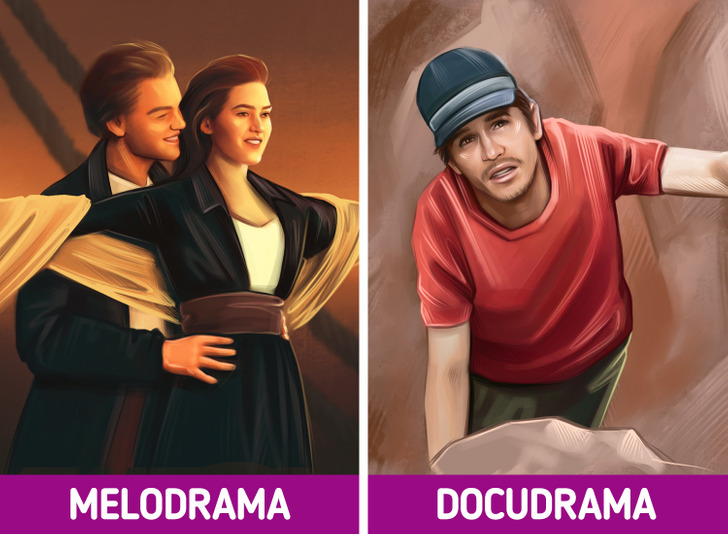
Drama is the king of cinema. It’s the genre that is most often mixed with others. The main part of the story is usually about problems and conflict and the plot includes very important events and changes in the lives of the character or it might revolve around small everyday stuff. Drama is supposed to make you feel as many emotions as possible with an aftertaste. To make the effect even more powerful, true stories are often used.
Subgenres:
- Melodrama — highlights the emotional elements, focuses on the characters’ feelings (Titanic).
- Tragedy — characters experience terrible, sad events that lead to an inevitable drama (Romeo + Juliet).
- Teen drama — focuses on the lives of teenagers, how they interact in groups, and about the general problems of this age (Euphoria).
- Philosophical drama — an exploration of the human condition, existence, and life itself (Boyhood).
- Medical drama — focuses on the work of hospitals, relationships between doctors, between staff, and patients (House).
- Legal drama — talks about the problems of criminal justice, it’s more about the relationships between the people at legal firms or courts, but not about crimes (The Firm).
- Political drama — focuses on the features and difficulties of everything that happens in politics. It might be a local story or even an international one (House of Cards).
- Anthropological drama — focuses on the drama derived from human behavior and society at large, or it might be about a certain culture (City of God).
- Religious drama — shows situations where religion plays a key part (The Passion of the Christ).
- Docudrama — takes real-life accounts and recreates them in a way that attempts to accurately represent events while also realizing the dramatic potential of those events (127 Hours).
Action
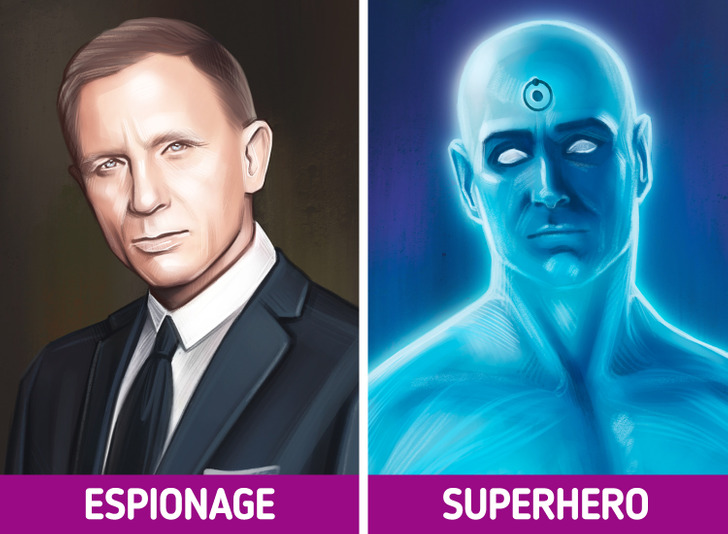
Action is one of the earliest movie genres. It focuses on action sequences, fights, stunts, chases, explosions, shootouts, and other set pieces. A popular story is where a protagonist fights against a villain or a group of bad guys. It has a lot in common with thrillers but mostly focuses on spectacle.
Subgenres:
- Heroic bloodshed — these movies are defined by duty, brotherhood, honor, and the protection of the weak. It was initially created in Hong Kong cinema but has since made its way around the world (Lung foo fung wan).
- Military action — while some films might include military characters or certain decorations, this subgenre is about the good deeds soldiers do and the stories are more entertaining than tragic (Commando).
- Espionage — it’s like military because it’s mostly for fun instead of focusing people’s attention on the political and psychological aspects of espionage. The most popular examples are James Bond movies.
- Disaster — defined by a large amount of destruction, specifically from naturally occurring events, where characters try to survive (The Day After Tomorrow). If an alien force is the force of destruction, the film will be categorized as science fiction rather than a straight disaster movie.
- Martial arts films — the fights are there for entertainment and they are the engine of the story and a method of character development. Usually, they include fights with stunts, car chases, and shooting (Enter the Dragon).
- Superhero — characters don’t just have superhero powers but also altruistic goals. If a film has superpowers used in a bad way, it’s most likely a thriller (Watchmen).
Comedy
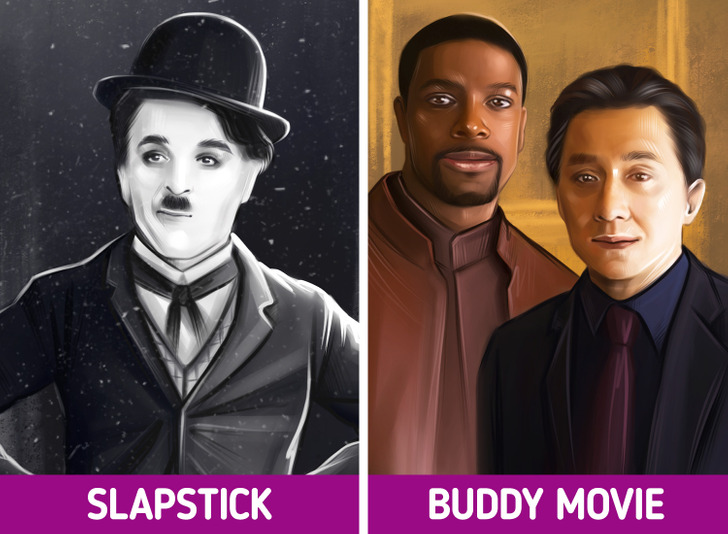
Comedies focus on humor and try to make viewers laugh. Usually, characters find themselves in difficult and/or funny situations that they can’t handle but have to. Good comedies are not just jokes but stories with full-fledged characters learning important lessons.
Subgenres:
- Slapstick — the humor is built on exaggerated, ridiculous, and often unrealistic events. The characters are really clumsy, and there are absurd situations (The Tramp, It’s a Mad Mad Mad Mad World).
- Black comedy — funnily talks about topics that are usually taboo or painful (Seven Psychopaths).
- Romantic comedy — more about funny plotlines focusing on romantic ideas like “true love is stronger than anything” (The Proposal).
- Buddy movie — 2 friends get into funny situations and try to get out of them (Rush Hour).
- Comedy action — includes funny situations woven into action and quick storytelling (The Gentlemen)
- Road movie — is about characters on a road trip from A to B where they meet other characters, make stops, and find themselves in funny situations (Due Date).
- Mockumentary — shoes imaginary events in documentary form (The Office).
Adventure
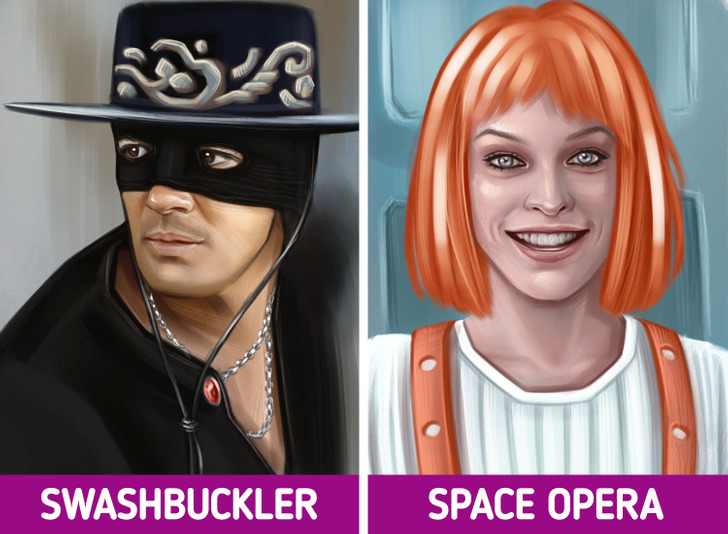
Adventure films often show journeys with some form of a chase. Usually, the setting is exotic and unusual. The characters might have to deal with problems like fights, piracy, rebellions, and the forming of empires and kingdoms.
Subgenres:
- Swashbuckler — the story develops in a romantic historical setting. The characters often show off athletic tricks and fencing (The Mask of Zorro).
- Action-adventure — a long quest with chases, each of them more dangerous and impossible than the previous one. The tension has to rise as the film ends: you will probably worry about whether the characters will get to a certain place or whether the antagonist will get there first (Raiders of the Lost Ark).
- Space opera — defined by the combination of space war, adventure, and romance. The genre is similar to soap operas (The Fifth Element).
Fantasy
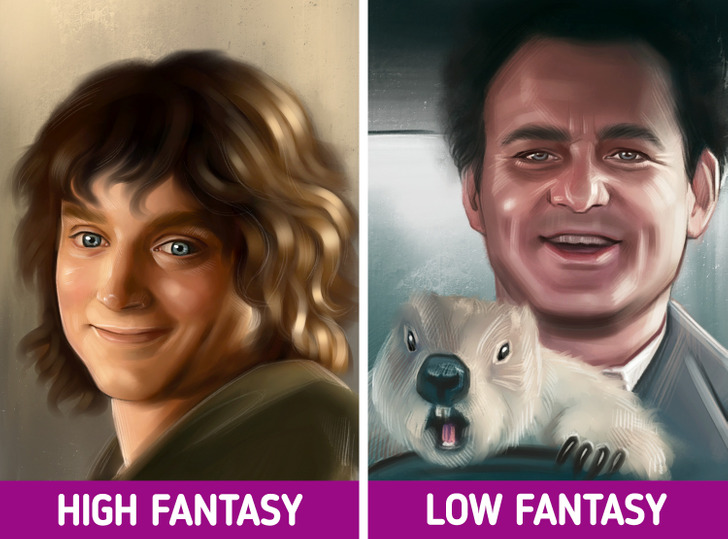
Fantasy films contain magical and supernatural elements that don’t exist in the real world. Sometimes, reality is combined with fantasy elements, but most films show completely imaginary universes with their own laws, logic, races, and creatures.
Subgenres:
- High fantasy — shows an imaginary world that has a unique history. It has a lot of races, like people, elves, orcs, and dwarfs and different creatures (dragons, unicorns), and others. High fantasy is epic with a lot of characters and long adventures (The Lord of the Rings: The Fellowship of the Ring).
- Low fantasy — the film happens in the real world where fantasy and magical elements appear abnormal for the world (Groundhog Day).
- Urban fantasy — is a story that introduces elements of fantasy and is set entirely in an urban environment. The urban environment can be real, fictional, modern, or inspired by history, but the story must take place and deal with concepts and themes related to an urban environment (Supernatural).
- Dark fantasy — based on scary topics, has a dark tone, and might have horror elements (Pan’s Labyrinth).
- Heroic fantasy — the events happen in a world where there’s magic and no modern technology. Unlike dark fantasy, there the rule “all men are strong, all women are beautiful, life is full of adventure, and all problems are simple” always works (Conan the Barbarian).
Sci-Fi
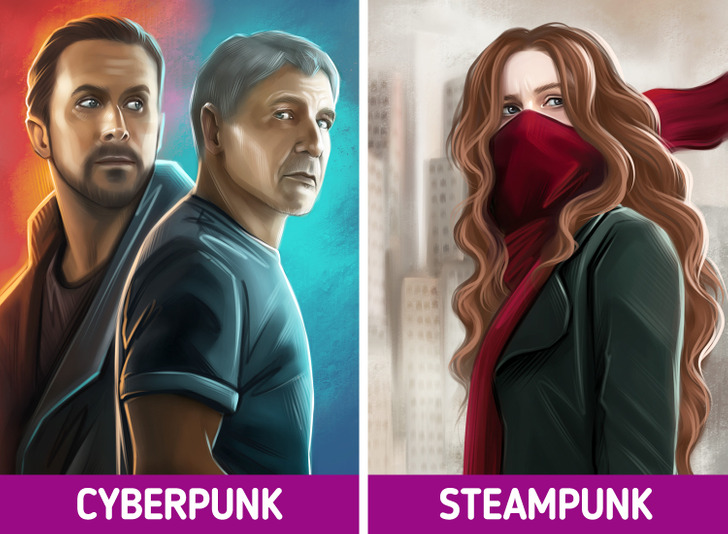
Sci-fi is a genre that revolves around different futuristic concepts. The stories are based on hypothetical scientific or technological achievements and discoveries and might also include the elements of intergalactic interactions.
Subgenres:
- Apocalyptic and post-apocalyptic fiction — the human civilization has fallen or is falling. The reasons might be climatic, astronomic, medical, natural, or more exotic: cyber rebellion, alien, or zombie attacks (28 Days Later...). Post-apocalyptic stories often happen in the world of the future (WALL·E).
- Utopian and dystopian fiction — explore social and political structures. Utopias show a perfect world (The Time Machine) while dystopias show terrible fear and tyrannical governments, ecological disasters, and others things that have to do with the social demise (V for Vendetta).
- Steampunk — inspired by the technology created in the 19th century and during the industrial revolution (Mortal Engines).
- Cyberpunk — defined by the mixture of a desperate society oversaturated with the crime that takes place in a high-tech world that includes cybernetic organisms, virtual reality, and artificial intelligence (Blade Runner).
Horror
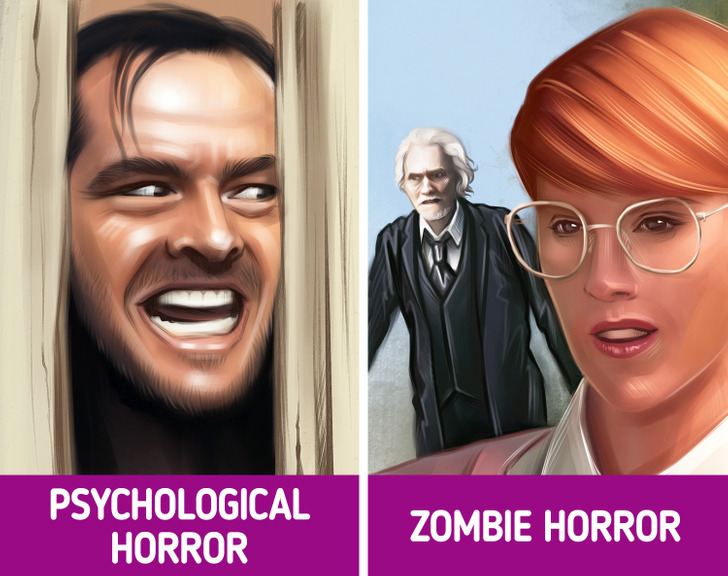
Horror movies are supposed to scare viewers, cause anxiety, press on their hidden fears, and entertain them (unlike thrillers). All the primitive and disgusting things that are attractive and scary are found in this genre.
Subgenres:
- Found footage — the entire film or a part of it is found footage. The events of the film can be shown through the cameras of the characters with their commentary. The footage looks raw, as if it were edited by the people that found it (The Blair Witch Project).
- Psychological horror — most of the film is about the psychological and emotional state of the characters. The main point of the film is to scare or throw the viewers off (The Shining).
- Zombie horror — the story is about characters trying to survive in a world full of zombies. The reason varies from infectious diseases to experimental medications (Night of the Living Dead).
Thriller
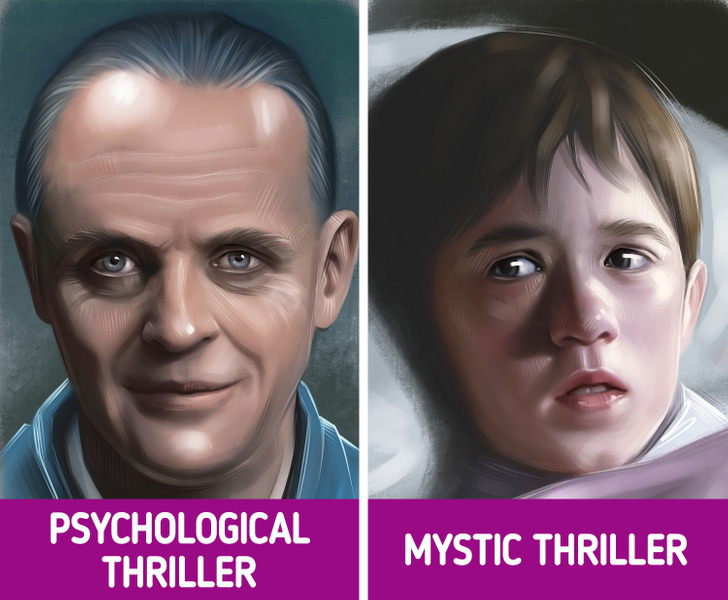
Thrillers are supposed to make viewers worried and anxious. Very often, the element of surprise is used. Tension is created by delaying the inevitable.
Subgenres:
- Psychological — focuses and emphasizes the unstable psychological state of the characters inside the story. Often there is a mysterious set of circumstances, and a paranoia, warranted or otherwise, that catalyzes the extreme actions from the characters (The Silence of the Lambs).
- Tech — is defined by a conflict that takes place for or through various forms of technology. What makes a techno-thriller different from various action sub-genres is the level of detail paid toward the underlying technical aspects of the technology and its effects (Oxygène).
- Mystic thriller — includes elements that have to do with the other world, tension, fear of the unknown, and unexpected plot twists. Sometimes, the main character or villain has superpowers (The Sixth Sense).
History
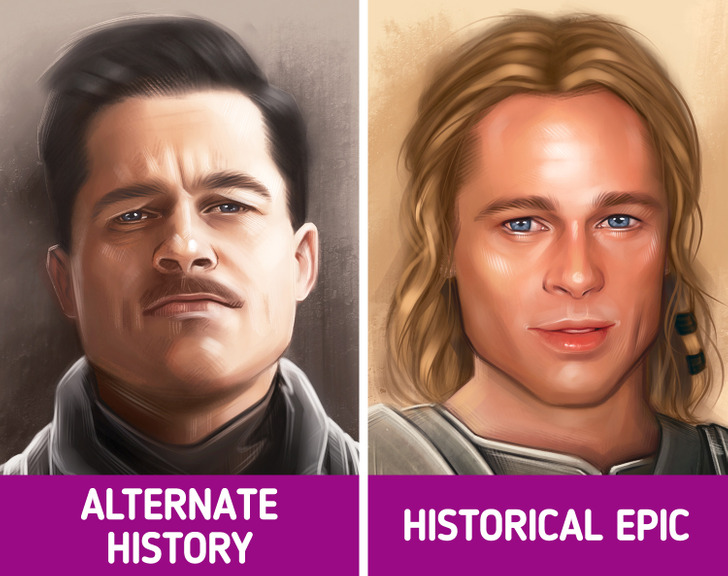
Historic films can be divided into 2 categories. The first are those that try to recreate the real events as close to the source as possible. The other ones cover imaginary situations put within the context of a historic period.
Subgenres:
- Biographies — the story is about a certain historic figure. Very often, almost the entire life of the character is shown but sometimes, only a period of time when the person made a big impact on history and society (Catch Me If You Can).
- Alternate history — defined by the rewriting of historical events for the sake of speculative outcomes. These movies commonly focus on important, highly influential moments that often lead to alternate futures. Some of these movies may even include supernatural elements (Inglorious Basterds).
- Historical epic — the dramatized account of a large-scale event that has an attached historical account. They often feature battles, romance, and journeys, and will commonly revise history or provide assumptions that fill in gaps in the account of the historical event (Troy).
Western
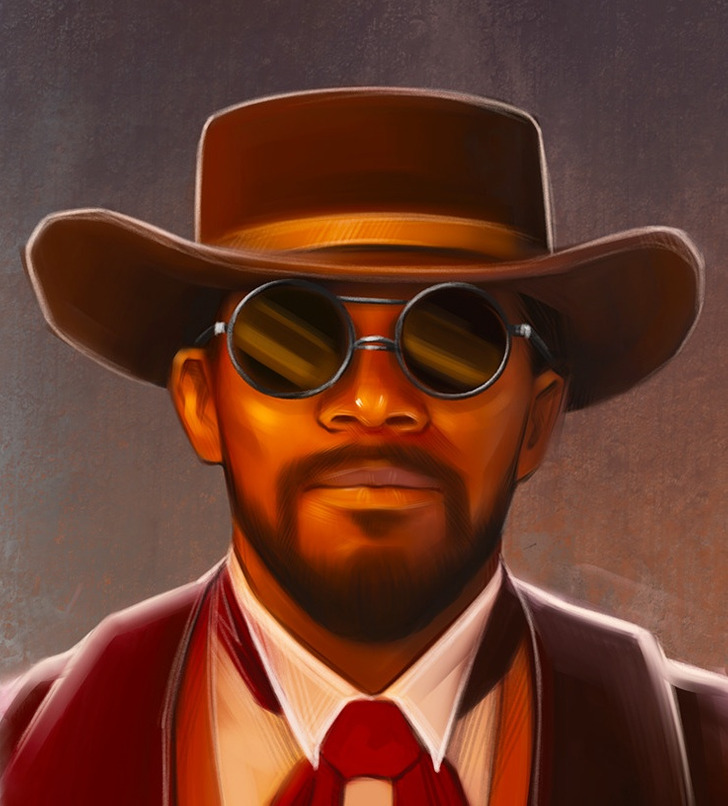
In westerns, the characters are in the American West of the 19th century to the beginning of the 20th century. The typical characters are cowboys, shooters, members of Native American tribes, and other similar characters. Besides, there’s a lot of horse riding, war expansion, railroads, shooting, and technologies created during the industrial revolution.
Subgenres:
- Epic western — the idea is to make as many elements usual for a western in the setting of a big real event that impacted the country’s history (Once Upon a Time in the West).
- Spaghetti western — the term has been used by critics because most of these films were produced and shot by Italians. They are free of the many limitations of traditional American westerns (Django).
- Revisionist western — destroys the standard format of westerns in several ways: using the criminals as the main characters and showing morally ambiguous stories. The lines between “right” and “wrong” are blurry (The Wild Bunch).
Bonus: How mood and feelings are connected with movie genres
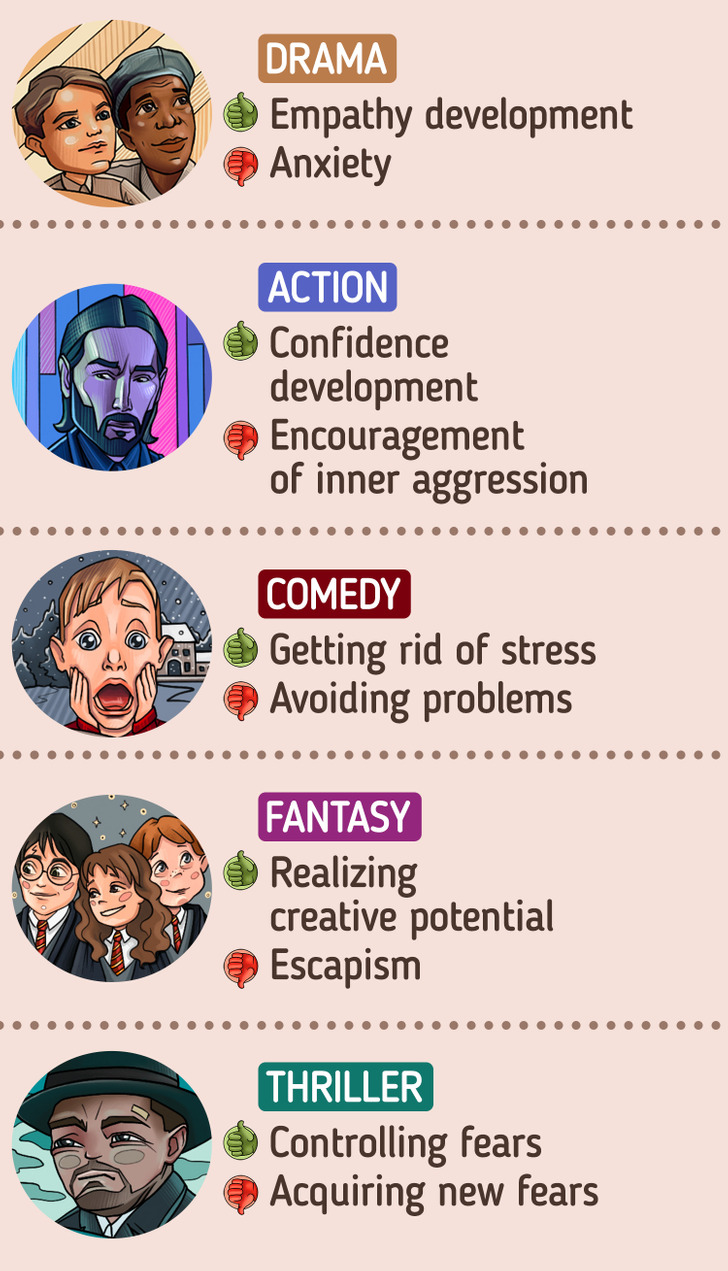
The feelings the movies in these genres make us feel:
- Drama — sadness, compassion, sympathy
- Action, adventure, western — anger, excitement, aggression, bravery
- Sci-fi, fantasy, history — interest, surprise
- Comedy — happy, entertained
- Horror, thriller — fear, anxiety
The impact of genres:
- Drama
✅ Development of empathy and acceptance, supporting social intelligence, understanding what to do with your own life
❌ Anxiety, cynicism, escapism
- Action, adventure, western
✅ The feeling of success and bravery, confidence and inspiration
❌ Encouraging your inner aggression, people might avoid overcoming their own problems
- Comedy
✅ Getting rid of stress, fear, and aggression, developing a creative approach, distancing from your own problems
❌ Cynicism, avoidance of problems
- Sci-fi, fantasy, historic movies
✅ Showing creative potential, a new vision of ordinary things, feeling free.
❌ Escapism, removing the lines between reality and fiction
- Horror, thriller
✅ Controlling your own fears, catharsis, reducing fear
❌ Going back to previous traumatic experiences, acquiring new fears